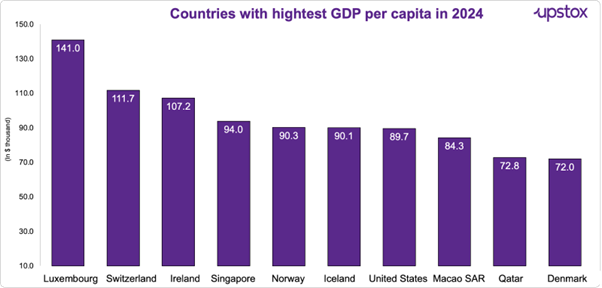Upstox Originals
How do countries like Luxembourg and Singapore become economic giants?
.png)
5 min read | Updated on June 02, 2025, 15:51 IST
SUMMARY
How do tiny nations like Luxembourg and Singapore consistently top global charts? Singapore ranks 4th in the Global Innovation Index 2024, leads in 14 innovation metrics. Luxembourg, with the world’s highest GDP per capita, benefits from a 47% cross-border workforce, boosting its economy without straining local services. This article breaks down the smart strategies behind their outsized success.

Tracking the growth of Luxembourg and Singapore as global trading centres
Small in size, giant in wealth - curious how? While most people associate economic power with large nations, Luxembourg and Singapore are proving that size doesn’t matter when it comes to building massive wealth.
Let’s put this into perspective. India’s 1.43 billion people are a far cry from Luxembourg’s 0.68 million or Singapore’s 5.86 million. Luxembourg is 2,000x smaller than India, and Singapore is 240x smaller.
Yet, these countries are punching way above their weight. Luxembourg ranks #1 globally in GDP per capita, while Singapore holds the 4th spot in the Global Innovation Index 2024. Does a smaller population help, sure. But is that the only driving factor, definitely not.
They’ve mastered the art of strategic planning and smart economic policies, making their small size their superpower. Let us look at the figures!

Source: IMF
The winning formula
Smart tax play
Luxembourg and Singapore know how to play the tax game! On paper, Luxembourg’s corporate tax rate hits 23.87% (with local taxes), but in practice, smart exemptions on investment funds and IP make it a haven for global giants.
By June 2024, this tiny country was managing a jaw-dropping €5.6 trillion ($6.3 trillion) in assets, ranking as the world’s #2 investment fund hub, just behind the USA. It’s no coincidence that over 340 global companies - from Amazon and Apple to IKEA and Pepsi - have set up shop there, drawn by tailored tax deals that turn official rates into sweet bargains.
Singapore keeps it simple with a flat 17% corporate tax rate. Startup-friendly perks:
-
75% exemption on the first $78,000, and 50% on the next $78,000 - for the first 3 years (qualified startups).
-
Pioneer incentive: Tax-free for up to 5 years for companies in tech, research, and manufacturing.
-
Avoid double tax: Singapore has 90+ agreements with other countries so businesses don’t get taxed twice.
-
R&D incentives: Claim up to 300% tax deductions on staff and research costs for the first $312,000.
-
Tax rebate: Get 50% off your corporate tax, up to $312,000, plus a $1,560 cash grant if you hire local employees.
And it’s working - Google, Facebook, and Unilever run Asia-Pacific ops from Singapore, while Amazon and PayPal base their European HQs in Luxembourg. Smart tax policies = business success.
High value industries
While most countries are stuck in mass production, Luxembourg and Singapore are dominating high-value sectors like finance, tech, and professional services. Luxembourg’s finance sector drives a massive 25% of its GDP, making it the second-largest investment fund hub globally, just behind the US.
Meanwhile, in Singapore, finance contributes 13.8% to GDP, and is leading the future with its Smart Nation program, from autonomous vehicles to AI-powered services and cutting-edge digital infrastructure, cementing its status as a smart city pioneer.
Innovation hubs
In 2024, Singapore ranked #1 in 14 out of 78 indicators on the Global Innovation Index. Not to be outdone, Luxembourg ranks 5th and leads in innovation inputs, focusing on knowledge-based jobs and institutional support.
Efficient governance and investment in human capital
Great economies aren’t just built on money, they’re built on people and smart policies. Take Singapore: In 2024, it crushed the World Bank’s Business Ready report with 87.33% in operational efficiency. Easy entry, smooth exits - Singapore’s clarity draws global capital.
The country offers a streamlined process for company incorporation, allowing businesses to register within 24–48 hours. Also, it does not impose capital gains tax, making it attractive for investors and entrepreneurs.
Luxembourg isn’t far behind - #1 in the EU for political stability, making it the go-to for long-term investments.
Greener, smarter futures
Luxembourg and Singapore aren’t just economic leaders - they're setting the pace in green finance too. Luxembourg became the first European country to establish a legal framework for green covered bonds in 2018, and by 2024, its Green Exchange (LGX) had crossed €1 trillion ($1.1 trillion) in sustainable and social bond listings. Today, it stands as the EU’s top green finance hub, according to the Global Green Finance Index.
And Singapore? It's on a mission with its Green Plan 2030, pushing boundaries with clean energy, eco-friendly transport, and sustainable infrastructure, all while shaping itself into the green, smart city of the future.
Lessons for India
What can India learn from the best? For starters, Luxembourg runs with 5,000+ investment funds and leads in space tech and sustainability. Singapore? It’s #1 in ease of doing business, offers a one-stop shop for startups, and attracts global talent with its Employment Pass. And that #1 passport, accessing 195 countries, is no joke. India sits at #63. Imagine the leap if we simplified MSME rules, built startup hubs like Bangalore into global magnets, and unlocked global mobility with smarter visa policies.
In summary
Luxembourg and Singapore prove that economic success isn’t about size — it’s about strategy.
These small nations have built global influence through smart tax incentives, top-tier education, strong connections, and future-driven governance. While their models may not be replicable, their foresight, adaptability, and ambition offer valuable lessons.
By signing up you agree to Upstox’s Terms & Conditions
About The Author
